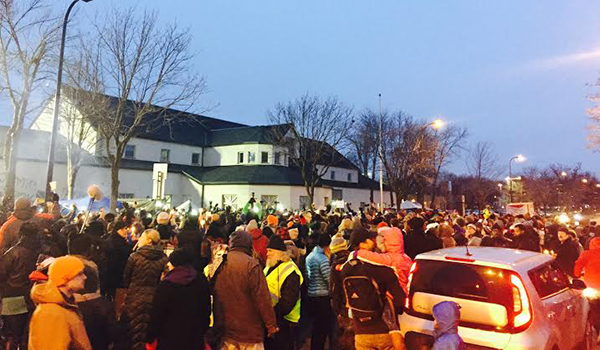Minneapolis, Chicago pastors call for truth-telling, reconciliation
 Covenant pastors in Minneapolis and Chicago are calling on the church to be instruments of peace in pursuing short and long-term solutions to racial issues between police and the African-American community.
Covenant pastors in Minneapolis and Chicago are calling on the church to be instruments of peace in pursuing short and long-term solutions to racial issues between police and the African-American community.
Protesters have camped and demonstrated in front of the Fourth Precinct police station in Minneapolis following the shooting death of Jamar Clark, a 24-year-old African-American, on Nov 15. On Tuesday, Chicago officials released a video that shows a Chicago police officer killing a 17-year-old African-American, Laquan McDonald. The officer shot him 16 times.
Clark was shot during what police say was a scuffle with officers who responded to an assault of a woman in which he was a suspect. Some witnesses say Clark was handcuffed at the time, which police have denied. A state criminal investigation and a federal civil rights probe are underway.
Protesters had gathered outside the Precinct 4 station since the incident, and five were shot on Monday by several men wearing ski masks. No one was killed, and four suspects were arrested.
Community Covenant Church is located blocks from the police station and held a gathering for prayer and discussion on Tuesday night that was attended by roughly 120 members of other Covenant congregations and people who live and work in the area. Covenant congregations represented were Sanctuary Covenant Church, First Covenant Church of St. Paul, First Covenant Church of Minneapolis, and Roots Covenant Church.
The meeting opened with a period of prayer and song that was followed by an open-microphone time in which people could share their fears, hopes and concerns and then discussed actions going forward, said Dennis Edwards, pastor of Sanctuary. His church meets at a school located five blocks from where Clark was shot.
“Anger was a word that was mentioned a lot,” Edwards said. “There also was a strong desire to be instruments of peace.”
Edwards said the Covenant congregations agreed to form a committee of members from each church that would help them plan coordinated ways to pursue justice and reconciliation.
Edwards said the short-term solutions should include peaceful protest in the same way the Apostle Paul did in Acts 16 when he demanded public recognition of the injustices, which included jailing and beating, that were inflicted on him and Silas.
“Unfortunately, there’s not a short-term solution to the problems,” Edwards said.
Members of several Covenant congregations were among the people who have protested outside the police station.
Luke Swanson, pastor of Community Covenant, lives just several blocks from where the protests are occurring and heard the shots that wounded five people Monday night. He had been at the protest earlier in the day.
On Tuesday, he said, “I’m heartbroken this morning.” The shootings have heightened the tension, Swanson added.
Swanson’s church has experienced the racism that many say lies beneath the surface of Minneapolis society but is not discussed enough and rarely addressed. His church was the victim of arson, and the arsonist scribbled racist-graffiti on church walls.
Prior to the Tuesday evening meeting, Swanson wrote in an email, “There is an opportunity for the Church to be a nonviolent presence for peace and justice. I have reminded others in the community to be careful with language and words because our children are listening and watching.”
Swanson added, “I have been encouraged by the many conversations I have had with community leaders and residents seeking change for our community. This is not a time for finger pointing but to be united. No matter what one’s opinion is, Christians can make space to grieve with people, to call everyone to value the human dignity of all people, to point the way to justice and help be a peaceful presence.”
Pursuing peace will mean telling and listening to difficult, painful truths amid the “chaos” that comes whenever communities move from having surface discussions to really trying to engage one another, Swanson said.
Pastors said that although they believe a majority of police try to do a good job, incidents of racial injustice are frequent and that the judicial system, as well as other aspects of society, are stacked against minorities.
In Chicago a judge ordered Chicago city officials to release the video of Laquan McDonald being shot after police refused requests that the public be allowed to see it. The officer was arrested for first-degree murder hours before the video was released on Tuesday.
Police, the district attorney, and mayor have been criticized because it took 14 months to charge the officer although the video clearly shows the deceased walking away from officers in direct contradiction to earlier police statements.
Bryan Hodges, pastor to men at Oakdale Covenant Church, said getting all the facts on each incident is important in forming a particular response. That can be difficult, however.
“One of our biggest issues is how the media fuels the way they want you to respond. They want to see a violent protest,” Hodges said.
Hodges agreed the video was horrific, and he questioned why there was such a long delay before an arrest was made. On Saturday, a men’s breakfast at the church involved several police officers from the congregation discussing issues related to law enforcement, the justice system, and relationships with the community.
This article originally appeared on covenantcompanion.com, and is reused with permission.